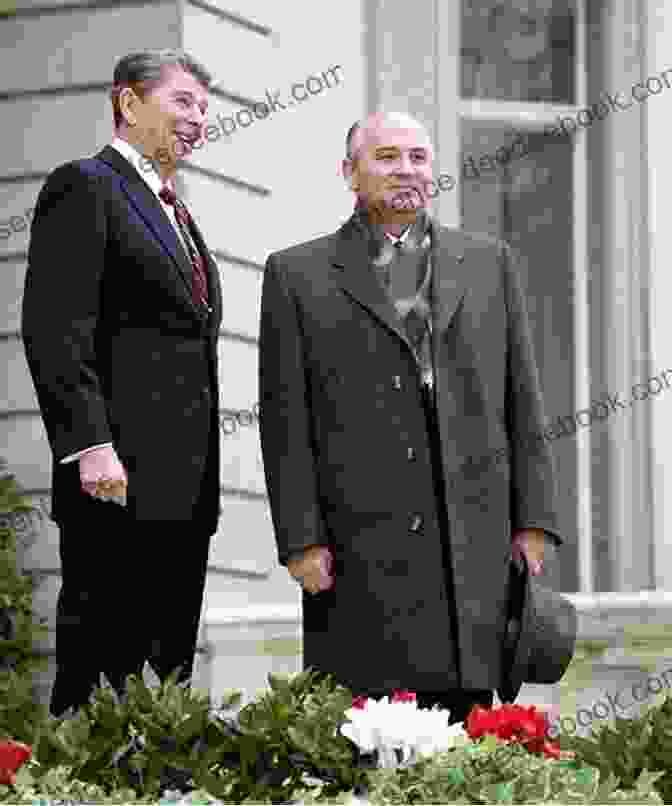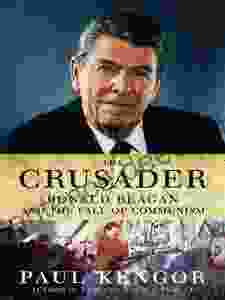Ronald Reagan and the Fall of Communism: A Transformative Legacy

Ronald Reagan, the 40th President of the United States, played a pivotal role in the downfall of communism, a global ideology that had dominated much of the 20th century. Reagan's policies and rhetoric, coupled with the economic and social challenges faced by communist regimes, paved the way for a series of dramatic events that ultimately led to the collapse of the Soviet Union and its satellite states.
4.7 out of 5
| Language | : | English |
| File size | : | 1367 KB |
| Text-to-Speech | : | Enabled |
| Screen Reader | : | Supported |
| Enhanced typesetting | : | Enabled |
| Word Wise | : | Enabled |
| Print length | : | 432 pages |
| Paperback | : | 167 pages |
| Item Weight | : | 11 ounces |
| Dimensions | : | 6 x 0.38 x 9 inches |

Reagan's Cold War Strategy
Reagan, a staunch anti-communist, campaigned on a platform of restoring American strength and confronting the Soviet Union. He believed that the Cold War had been a stalemate due to the West's weakness and appeasement policies. Reagan's approach was to increase military spending, rebuild America's defenses, and promote capitalism as a superior economic system to communism.
Reagan also pursued a policy of "containment," aimed at preventing the spread of communism to other countries. He supported anti-communist movements and governments in Afghanistan, Nicaragua, and elsewhere. Reagan's hardline stance and determination to challenge the Soviet Union became known as the "Reagan Doctrine."
The Economic and Social Challenges of Communism
The Soviet Union and its communist allies faced numerous economic and social problems that contributed to their decline. The command economy, characterized by central planning and state ownership, stifled innovation, efficiency, and economic growth. Consumer goods were often scarce, and living standards were stagnant.
Additionally, communist regimes suppressed political dissent, restricted freedom of speech, and controlled access to information. This stifled creativity, discouraged entrepreneurship, and created a climate of fear and oppression.
The Rise of Solidarity in Poland
In 1980, a labor movement called Solidarity emerged in Poland, challenging the communist government's control over the economy and society. Solidarity, led by Lech Walesa, gained widespread support among workers and intellectuals and became a symbol of resistance against communism.
The Polish government's crackdown on Solidarity prompted Reagan to impose economic sanctions on Poland and other Eastern Bloc countries. The sanctions, along with Solidarity's continued mobilization, weakened the communist regime and paved the way for the eventual collapse of communism in Poland.
Glasnost and Perestroika in the Soviet Union
Mikhail Gorbachev, who became General Secretary of the Communist Party of the Soviet Union in 1985, initiated two major reforms: glasnost (openness) and perestroika (restructuring). Glasnost allowed for greater freedom of speech and press, while perestroika aimed to decentralize the economy and introduce elements of market competition.
While Gorbachev's reforms were intended to strengthen communism, they inadvertently exposed the weaknesses and discontent within the Soviet system. The newfound freedom of speech allowed dissenters to voice their grievances, while perestroika failed to revitalize the economy.
The Fall of the Berlin Wall
In November 1989, the Berlin Wall, a symbol of the division between communist East Germany and democratic West Germany, was opened. The event triggered a wave of pro-democracy protests and demonstrations throughout Eastern and Central Europe.
Reagan's role in the fall of the Berlin Wall was significant. His unwavering support for freedom and democracy had inspired people behind the Iron Curtain. His "Tear down this wall!" speech, delivered at the Berlin Wall in 1987, had become a powerful symbol of the struggle against communism.
The Collapse of the Soviet Union
The fall of the Berlin Wall set in motion a series of events that ultimately led to the collapse of the Soviet Union. Nationalist movements in Eastern and Central Europe gained momentum, demanding independence and democratic reforms.
In August 1991, a failed coup attempt by hardline communists against Gorbachev exposed the fragility of the Soviet government. With the support of Boris Yeltsin, the first democratically elected President of Russia, Gorbachev dissolved the Soviet Union on December 26, 1991.
Reagan's Legacy and Impact
Ronald Reagan's presidency marked a watershed moment in the history of the Cold War and the decline of communism. His hardline stance, military buildup, containment policy, and support for anti-communist movements and governments played a significant role in weakening the Soviet Union.
Reagan's rhetoric, emphasizing freedom, democracy, and the superiority of capitalism, inspired people behind the Iron Curtain and contributed to a global shift towards democratic values.
The collapse of communism had profound implications for the world. It marked the end of a decades-long ideological struggle and the emergence of a unipolar world dominated by the United States.
However, Reagan's legacy remains complex and contested. Some historians argue that his policies accelerated the collapse of communism, while others contend that economic and social factors within the Soviet Union were the primary drivers.
Ronald Reagan's presidency was a transformative period in the history of the Cold War and the global struggle against communism. His unwavering belief in American strength, freedom, and democracy, coupled with the economic and social problems faced by communist regimes, set the stage for the decline of communism.
The fall of communism had a lasting impact on the world, leading to the spread of democracy and the emergence of a more interconnected and globalized world. Reagan's legacy as a staunch anti-communist and a champion of freedom will continue to be debated, but his role in the downfall of communism remains undeniable.
4.7 out of 5
| Language | : | English |
| File size | : | 1367 KB |
| Text-to-Speech | : | Enabled |
| Screen Reader | : | Supported |
| Enhanced typesetting | : | Enabled |
| Word Wise | : | Enabled |
| Print length | : | 432 pages |
| Paperback | : | 167 pages |
| Item Weight | : | 11 ounces |
| Dimensions | : | 6 x 0.38 x 9 inches |
Do you want to contribute by writing guest posts on this blog?
Please contact us and send us a resume of previous articles that you have written.
 Page
Page Chapter
Chapter Text
Text Paperback
Paperback E-book
E-book Magazine
Magazine Newspaper
Newspaper Paragraph
Paragraph Shelf
Shelf Bibliography
Bibliography Synopsis
Synopsis Annotation
Annotation Manuscript
Manuscript Scroll
Scroll Codex
Codex Bestseller
Bestseller Classics
Classics Narrative
Narrative Biography
Biography Autobiography
Autobiography Dictionary
Dictionary Thesaurus
Thesaurus Narrator
Narrator Librarian
Librarian Catalog
Catalog Stacks
Stacks Research
Research Lending
Lending Academic
Academic Journals
Journals Reading Room
Reading Room Study Group
Study Group Thesis
Thesis Dissertation
Dissertation Storytelling
Storytelling Awards
Awards Reading List
Reading List Book Club
Book Club Theory
Theory Textbooks
Textbooks Brooke Levine
Brooke Levine Dushan Wegner
Dushan Wegner Israelin Shockness
Israelin Shockness Jerry G Walls
Jerry G Walls Charlie Ward
Charlie Ward Nicolas Sabouret
Nicolas Sabouret Mary Tavener Holmes
Mary Tavener Holmes Catherine Meyrick
Catherine Meyrick Greg Westrich
Greg Westrich Karen Solomon
Karen Solomon William James
William James Sam Hodges
Sam Hodges Sarah Maury Swan
Sarah Maury Swan Deborah Grace White
Deborah Grace White Emily Ribbons
Emily Ribbons Vangi Pantazis
Vangi Pantazis Orlando Crespo
Orlando Crespo Stuart Clayton
Stuart Clayton Maryann Marshall
Maryann Marshall Charles Reasoner
Charles Reasoner
Light bulbAdvertise smarter! Our strategic ad space ensures maximum exposure. Reserve your spot today!
 Haruki MurakamiFollow ·8.2k
Haruki MurakamiFollow ·8.2k J.R.R. TolkienFollow ·6.1k
J.R.R. TolkienFollow ·6.1k Ernest PowellFollow ·14.4k
Ernest PowellFollow ·14.4k John Dos PassosFollow ·19.3k
John Dos PassosFollow ·19.3k Harvey HughesFollow ·11.7k
Harvey HughesFollow ·11.7k Billy FosterFollow ·13.3k
Billy FosterFollow ·13.3k Pat MitchellFollow ·19.6k
Pat MitchellFollow ·19.6k Sam CarterFollow ·17.8k
Sam CarterFollow ·17.8k

 Darren Nelson
Darren NelsonLife of Napoleon Bonaparte, Volume II: His Rise to Power
**** Napoleon...

 Reed Mitchell
Reed MitchellLucy Sullivan Is Getting Married: A Tale of Love,...
Lucy Sullivan is a...

 Chuck Mitchell
Chuck MitchellBeginner's Crash Course on Python Language: Getting...
Python is a widely used programming...

 Henry Hayes
Henry HayesThreads Fitting For Every Figure: A Comprehensive Guide...
Finding the perfect fit can be a...

 Duane Kelly
Duane KellyA Comprehensive Cat Guide to Money: Feline Finance for...
In the world of finance, humans have...

 Jedidiah Hayes
Jedidiah HayesThe Sentimental Hippo And His Friends
Harvey the hippo was a very sentimental...
4.7 out of 5
| Language | : | English |
| File size | : | 1367 KB |
| Text-to-Speech | : | Enabled |
| Screen Reader | : | Supported |
| Enhanced typesetting | : | Enabled |
| Word Wise | : | Enabled |
| Print length | : | 432 pages |
| Paperback | : | 167 pages |
| Item Weight | : | 11 ounces |
| Dimensions | : | 6 x 0.38 x 9 inches |












